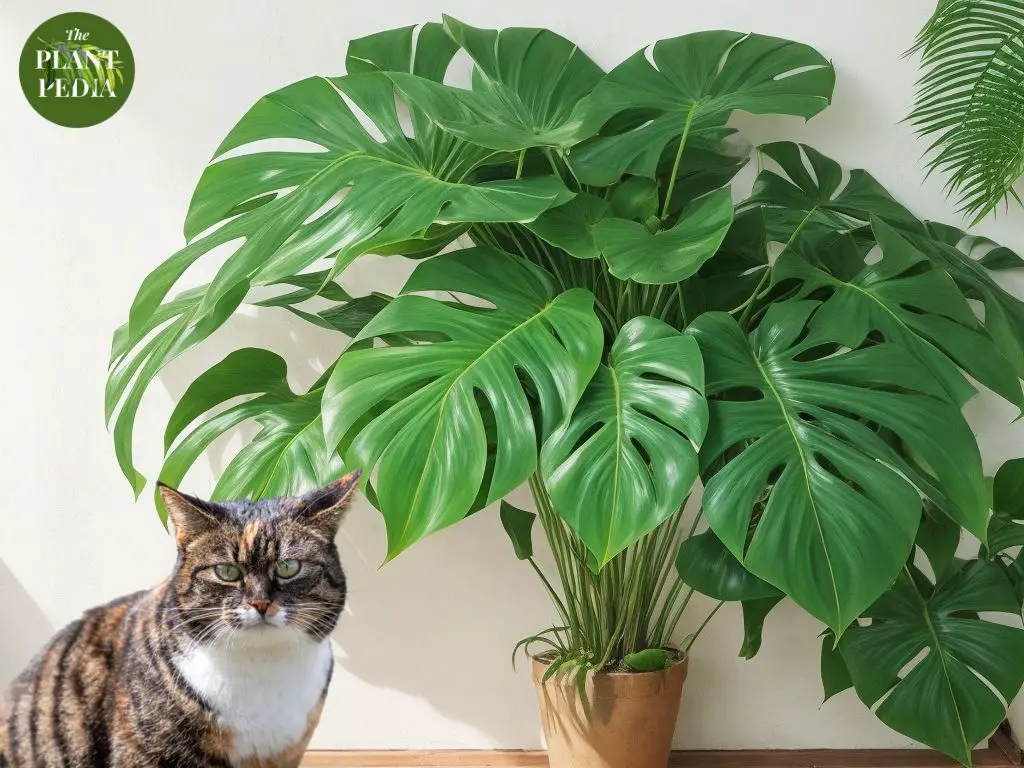Indoor plants not only enhance the aesthetic appeal of our homes but also contribute to a healthier living environment.
One popular choice among plant enthusiasts is the Monstera, known for its unique foliage and low maintenance requirements.
However, if you’re a cat owner, you might be wondering whether this trendy plant poses a threat to your feline companion.
In this detailed guide, we will delve into the details regarding Monstera plants and their potential toxicity to cats.
Understanding Monstera Plants
The Monstera Deliciosa, commonly referred to as the Swiss Cheese Plant, is a tropical vine native to Central and South America.
It’s renowned for its distinct split leaves, which give it a unique, artistic appearance. Due to its adaptability to various indoor environments, it has gained immense popularity as a houseplant.
Read: Albino Monstera: Care, Propagation, Challenges, & All.

Are Monstera Plants Toxic to Cats?
Yes, Monstera plants are considered to be toxic to cats. This is primarily due to the presence of calcium oxalate crystals in the plant.
When ingested, these crystals can cause irritation and discomfort in a cat’s mouth, esophagus, and digestive tract.
The severity of toxicity ranges from mild to moderate, with symptoms including drooling, pawing at the mouth, vomiting, diarrhea, and abdominal pain.
In rare cases, if a cat consumes a large amount or larger portions of the plant, there is a risk of intestinal obstruction, which requires immediate veterinary attention.
It’s important for cat owners to be vigilant and take precautionary measures to prevent their feline companions from accessing Monstera plants.
This can include placing the plants in areas where cats cannot easily reach them, providing cat-friendly alternatives for them to interact with, and supervising interactions with plants.
In case of ingestion, contacting a veterinarian promptly is crucial for proper guidance and treatment.
Are Monstera Toxic to Dogs?
Yes, Monstera plants are considered to be toxic to dogs as well. Like in cats, the Monstera plant contains calcium oxalate crystals which can cause irritation and discomfort if ingested. The severity of toxicity can range from mild to moderate.
Common signs of Monstera ingestion in dogs include drooling, pawing at the mouth, vomiting, diarrhea, and abdominal pain. In severe cases or with repeated exposure, there may be potential for more serious complications.
As with cats, if you suspect that your dog has ingested any part of a Monstera plant, it’s important to contact your veterinarian immediately. They can provide specific advice based on the situation and the size and breed of your dog. Remember, prompt attention is crucial for the best outcome.
The Risks: What Happens When Cats Ingest Monstera?
1. Oral Irritation
If a cat nibbles on Monstera leaves, it may experience symptoms such as drooling, pawing at the mouth, and discomfort. This is a direct result of the calcium oxalate crystals causing irritation in the oral cavity.
2. Gastrointestinal Upset
Ingesting Monstera can lead to gastrointestinal issues like vomiting, diarrhea, and abdominal pain. These symptoms may appear within a few hours of ingestion.
3. Potential Obstruction
In rare cases, if a cat consumes a large amount of Monstera or ingests larger portions of the plant, there is a risk of an intestinal obstruction. This is a severe medical emergency and requires immediate veterinary attention.
Severity of Toxicity: Mild to Moderate
It’s essential to note that while Monstera plants can cause discomfort and mild to moderate toxicity in cats, severe cases are relatively uncommon.
However, this does not mean the risks should be taken lightly. Any sign of ingestion should be treated seriously and addressed promptly.
Recognizing the Symptoms: What to Watch For
If you suspect your cat has ingested Monstera, it’s crucial to be vigilant for any signs of distress. Common symptoms include:
- Excessive drooling
- Pawing at the mouth
- Vomiting
- Diarrhea
- Lethargy
- Loss of appetite
What to Do If Your Cat Ingests Monstera
- Contact Your Veterinarian: In case of ingestion, reach out to your vet immediately. Provide them with detailed information regarding the plant and the quantity your cat might have consumed.
- Monitor Symptoms: Keep a close eye on your cat for any signs of distress. Document any changes in behavior or physical condition.
- Do Not Induce Vomiting: Unlike dogs, inducing vomiting in cats can be dangerous and should only be done under the guidance of a veterinarian.
Prevention and Safety Measures
1. Placement
Ensure that Monstera plants are placed in areas where your cat cannot easily access them. Consider hanging them or using high shelves.
2. Supervision
If your cat tends to be curious about plants, consider supervised interactions to prevent any potential nibbling.
3. Distract with Cat-Friendly Plants
Provide your cat with their own cat-friendly plants, like catnip or cat grass, to divert their attention from potentially harmful ones.
4. Regular Health Checks
Schedule routine veterinary visits to monitor your cat’s overall health and catch any potential issues early.
Related FAQs:
1. What makes Monstera plants toxic to cats?
- Monstera plants contain calcium oxalate crystals, which are sharp, needle-like structures. When ingested, these crystals can cause irritation and discomfort in a cat’s mouth, esophagus, and digestive tract.
2. What are the common signs of Monstera plant ingestion in cats?
- Common signs of Monstera ingestion in cats include excessive drooling, pawing at the mouth, vomiting, diarrhea, lethargy, and loss of appetite.
3. How severe is the toxicity of Monstera plants to cats?
- The toxicity of Monstera plants to cats is considered to be mild to moderate. Severe cases are relatively rare but can occur, especially if a cat ingests a large amount or significant portions of the plant.
4. What should I do if I suspect my cat has ingested Monstera?
- If you suspect your cat has ingested Monstera, it’s important to contact your veterinarian immediately. Provide them with detailed information about the plant and the quantity your cat might have consumed.
5. Can inducing vomiting help if my cat has ingested Monstera?
- No, inducing vomiting in cats can be dangerous and should only be done under the guidance of a veterinarian. Unlike dogs, cats are more susceptible to complications from induced vomiting.
6. Are all parts of the Monstera plant equally toxic to cats?
- Yes, all parts of the Monstera plant, including the leaves, stems, and roots, contain the calcium oxalate crystals that make it potentially toxic to cats.
7. How can I prevent my cat from accessing Monstera plants?
- Place Monstera plants in areas where your cat cannot easily reach them. Consider hanging them or using high shelves. Additionally, provide your cat with cat-friendly plants like catnip or cat grass to divert their attention.
8. Can Monstera plants be harmful to other pets or children?
- Yes, Monstera plants can also be toxic to dogs and can cause similar symptoms. Ingestion of Monstera can also lead to irritation in humans if the plant’s sap comes into contact with the skin or eyes.
9. Is there a safe way to enjoy Monstera plants if I have cats?
- While it’s possible to have Monstera plants in a home with cats, it’s crucial to take precautionary measures. Place the plants in areas that are not easily accessible to cats and provide cat-friendly alternatives for them to interact with.
10. What other common houseplants are toxic to cats?
- Some other common houseplants that are toxic to cats include lilies, aloe vera, poinsettias, and philodendrons. It’s important for cat owners to research the toxicity of any plants they have in their homes.
11. What are the long-term effects of Monstera plant ingestion in cats?
- Long-term effects can vary depending on the severity of the ingestion. In mild cases, symptoms may subside with proper care. However, in more severe cases or with repeated exposure, there may be potential for chronic digestive issues.
12. Can Monstera toxicity in cats lead to kidney or liver problems?
- While Monstera toxicity primarily affects the digestive tract, in severe cases, prolonged gastrointestinal distress can potentially lead to secondary complications. However, this is considered rare.
13. Are there any safe varieties of Monstera plants for homes with cats?
- While all Monstera plants contain calcium oxalate crystals, some varieties may have lower concentrations. However, it’s crucial to remember that even lesser concentrations can still pose a risk to cats.
14. What should I do if my cat shows mild symptoms of Monstera ingestion?
- Even if the symptoms are mild, it’s essential to contact your veterinarian. They can provide advice on how to manage the situation and monitor your cat’s condition. Mild symptoms can escalate, so professional guidance is crucial.
15. Can Monstera plants cause allergies in cats without ingestion?
- Yes, like many plants, Monstera can release pollen or other allergenic particles into the air. This could potentially trigger allergies in some sensitive cats, even without direct ingestion.
16. Are there any Monstera plant alternatives that are safe for cats?
- Yes, there are several houseplants that are considered safe for cats. Some examples include spider plants (Chlorophytum comosum), Boston ferns (Nephrolepis exaltata), and some varieties of palm plants.
17. How do I safely clean up if my cat has ingested Monstera?
- If you suspect your cat has ingested Monstera, it’s important to seek professional veterinary advice immediately. The cleanup process would depend on the specific situation and would likely involve guidance from your veterinarian.
18. Can Monstera toxicity be lethal for cats?
- While severe cases of Monstera toxicity in cats are rare, it’s theoretically possible in extreme circumstances. This is why prompt veterinary attention is crucial if ingestion is suspected.
19. Is there an antidote for Monstera plant toxicity in cats?
- There is no specific antidote for Monstera toxicity. Treatment typically involves supportive care, which may include IV fluids, anti-nausea medications, and monitoring for complications.
20. Can outdoor Monstera plants be a risk to neighborhood cats?
- While Monstera is primarily an indoor plant in most regions, if it is grown outdoors in areas where cats roam freely, there could be a potential risk. It’s recommended to exercise caution and consider fencing or other barriers if necessary.
Conclusion
While Monstera plants can add a touch of nature’s artistry to our homes, it’s essential for cat owners to be aware of the potential risks they pose.
By understanding the nature of the toxicity and implementing precautionary measures, you can create a safe environment for both your beloved feline companion and your cherished greenery.
Remember, responsible pet ownership entails being informed and proactive, ensuring that every member of your household, furry or leafy, can coexist harmoniously.
